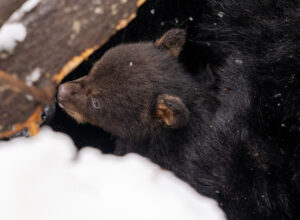Pictured: DNR scientists are conducting a study to learn more about black bear cub survival rates. Photo by Wisconsin DNR.
The Wisconsin DNR is asking the public to report any black bear den locations across Wisconsin. This will help with an ongoing study on black bear reproduction in Wisconsin.
The Black Bear Litter and Diet Survey, now entering its third year of data collection, will generate updated estimates of black bear reproductive rates within each of the state’s bear management zones. These updated estimates will improve the accuracy of the population models used in each zone.
Additionally, researchers are investigating a possible connection between the consumption of human food by bears and bear reproduction success. Diet can affect cub survival rates and litter sizes.
“The reports we receive from the public are an essential piece of this project,” says Dr. Jennifer Price Tack. Price Tack is the DNR Large Carnivore and Elk Research Scientist. “Obviously, people don’t find bear dens every day, so it is important that people report them to us when they find them. Den reports help us meet sample size requirements for the study, which will increase the accuracy of black bear population estimates.”
The DNR encourages the public to report as much information about occupied black bear dens as possible. But do not approach or disturb the dens. Helpful information to report to the bear research team includes:
- GPS coordinates of the den
- Photos of the den, ideally showing it relative to its surroundings, from a safe distance (approximately 30 yards)
- Description of the den site and surrounding area, including landmarks
- Any information on the bear(s) and bear activity near the site
Price Tack and her team will work with den reporters and landowners to visit the sites. The research team may be unable to visit every reported den location this season. Occupied dens are the priority.


